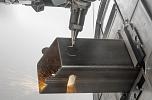Editor
- FMA
- The Fabricator
- FABTECH
- Canadian Metalworking
Canada’s Got Skills
- By Joe Thompson
- May 5, 2015
It takes a long time to develop skills, and they degrade with disuse. Anyone who has witnessed my golf short game can attest to that.
Skills can be learned and passed along so that future generations don’t need to walk the exact same path as those that have come before, repeating unnecessary steps. This accumulated and shared knowledge is at the heart of what it means to be human. For example, once our ancestors learned how to make fire, they passed that knowledge down so the following generation didn’t need to relearn that particular skill.
The manufacturing sector in this country seems to have forgotten this legacy.
In a 1900 letter (remember those?) to fellow flying pioneer Octave Chanute, inventor and aviator scarf wearer Wilbur Wright opined that “It is possible to fly without motors, but not without knowledge and skill.”
When we turn Wright’s thought into a metaphor, it becomes very apt for manufacturing; and it’s time to get off the ground.
Focusing on short-term goals—parts per hour, daily OEE, and the margins of individual jobs—is necessary to succeed in business, but they shouldn’t be more important than long-term goals; rather, they should be as important.
Transfer of knowledge should be part of a manufacturing business’s long-term goals. Not only does this create workers with a larger skill set, it protects the business from the illness, retirement, or termination of a key, longtime employee.
Adding skills can be a life-long endeavor, but if you are an old dog/new tricks believer, you can still play a part by supporting the ingress of youth into manufacturing.
Supporting the Skills Canada competition is one way to do so.
Skills Canada was founded in 1989 to promote skilled trades and technology careers among Canadian youth to secure the country’s future skilled-labor needs while helping young people discover rewarding careers.
This year’s 29-member team will represent the country in Brazil this August at the 43rd World- Skills Competition. Team Canada, all of whom are under 23 years of age, competed and won at the Skills Canada National Competition and completed the final step of qualification for the international team through the World- Skills Canadian Trials. In Brazil, they will test their skills against more than 1,000 competitors.
The Team Canada competitors represent this nation’s future. WorldSkills is a broad competition, but the manufacturing sector will be represented by:
Carson Gustafson, Mechanical Engineering Design—CAD, Lashburn, Sask.
Trevor Fandrick, CNC Turning, Calmar, Alta.
Tyler Magri, CNC Milling, Churchill, Ont.
Tommy St-Martin, Welding, Notre-Dame-des-Prairies, Que.
If you know a young person with skills, it’s time to show the world that Canada is still a manufacturing powerhouse. Get involved.
subscribe now


Keep up to date with the latest news, events, and technology for all things metal from our pair of monthly magazines written specifically for Canadian manufacturers!
Start Your Free SubscriptionAbout the Author

Joe Thompson
416-1154 Warden Avenue
Toronto, M1R 0A1 Canada
905-315-8226
Joe Thompson has been covering the Canadian manufacturing sector for more than two decades. He is responsible for the day-to-day editorial direction of the magazine, providing a uniquely Canadian look at the world of metal manufacturing.
An award-winning writer and graduate of the Sheridan College journalism program, he has published articles worldwide in a variety of industries, including manufacturing, pharmaceutical, medical, infrastructure, and entertainment.
- Trending Articles
CWB Group launches full-cycle assessment and training program

Achieving success with mechanized plasma cutting

3D laser tube cutting system available in 3, 4, or 5 kW

Brushless copper tubing cutter adjusts to ODs up to 2-1/8 in.

Welding system features four advanced MIG/MAG WeldModes

- Industry Events
MME Winnipeg
- April 30, 2024
- Winnipeg, ON Canada
CTMA Economic Uncertainty: Helping You Navigate Windsor Seminar
- April 30, 2024
- Windsor, ON Canada
CTMA Economic Uncertainty: Helping You Navigate Kitchener Seminar
- May 2, 2024
- Kitchener, ON Canada
Automate 2024
- May 6 - 9, 2024
- Chicago, IL
ANCA Open House
- May 7 - 8, 2024
- Wixom, MI
















